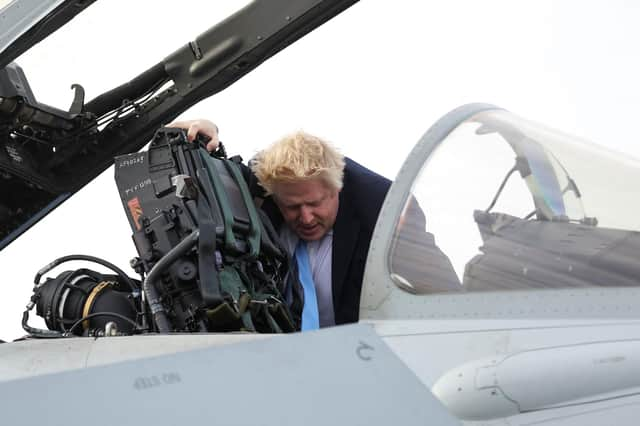Ukraine-Russia crisis: As Vladimir Putin threatens war, Boris Johnson's Brexiteers are continuing to damage western unity – Joyce McMillan


The one thing that is right about Wallace’s comment, of course, is his assessment of the seriousness of the current crisis between Russia and Ukraine.
Unlike the UK’s laughable Foreign Secretary Liz Truss, who celebrated her visit to Moscow by making a pop video of herself in an unnecessary fur hat, Wallace perceives that having effectively allowed Vladimir Putin’s Russia to take back the Ukrainian territory of Crimea in 2014, the West now needs to draw some lines, on the plains of eastern Europe.
Advertisement
Hide AdAdvertisement
Hide AdThis means not only supporting the sovereignty of Ukraine, but also providing rock-solid guarantees to the three Baltic states, now EU and Nato members, whose loss Russia continues to resent; and the faint parallels with Nazi expansionism in the 1930s, when Neville Chamberlain signed his notorious and short-lived Munich pact with Hitler, will not escape anyone with a passing knowledge of European history.
That, though, is as far as any defence of Wallace’s “Munich” comment can go; because its clear implication – that bulldog Britain is now standing up to the Russian threat, while others in Europe cannot be trusted to do so – is about as offensive, arrogant, and ill-advised as it could possibly be, under the circumstances.
Of course, in terms of political pressure, the Ukraine crisis has come as something of a relief to a Conservative government now besieged at home by allegations of illegal conduct and corrupt dealings; and some sections of the media have co-operated in the effort to present the UK as some kind of leader of the western response.
In truth, though, this flattering 1940-style image of Britain is false in at least three ways, if not downright delusional.
In the first place, while Britain has shown willingness to shift arms towards Ukraine, and British troops to the eastern borders of Nato, the amounts the UK can deliver, after decades of military spending cuts, are vanishingly small.
They have some symbolic importance, of course; but the idea that Britain still has the military might to make a significant difference, in any future conflict with Russia, is a fantasy at least a generation out of date.
Then secondly, there is the dire impact of remarks like Wallace’s on the UK’s relations with other western allies. Even as Boris Johnson emits sonorous statements about the need for a strong and united western response, his government and parliamentary party – shaped by the single demand that they comply with the Brexit project, and with the lies it entailed – simply cannot help sniping and sneering at the major European powers, and treating their laudable aversion to war as a sign of weakness, and willingness to surrender to an adversary whose agreements are not worth the paper they are written on.
Add to this casual insult the real international agreement-breaking and treaty-tearing recently threatened by the British government itself – over Brexit in general, and the Northern Ireland protocol in particular – and a picture emerges of a government which barely understands the meaning of international co-operation, except as a photo opportunity; and which has in fact spent the last half-dozen years seeking to undermine and fracture the European Union, to Vladimir Putin’s evident satisfaction.
Advertisement
Hide AdAdvertisement
Hide AdFor if we must talk of whiffs in the air, then as Tory MP Tom Tugendhat argued this week, it is long past time to tackle the unsavoury tangle of financial ties that links the present UK government to the growing presence in the British economy of wealthy Russian oligarchs, close to the Putin regime.
A quarter of Boris Johnson’s cabinet are known to have accepted political donations from wealthy Russian sources in the UK; and this week, the Labour shadow Chancellor and Foreign Secretary wrote to their government counterparts, asking that the Conservative Party as a whole return almost £2 million of donations received from such sources since 2019.
As Westminster’s Intelligence and Security Committee noted, in their 2020 Russia Report, the UK government has launched no investigation into the substantial evidence that Russia intervened heavily on the Leave side in the 2016 Brexit referendum; and it has also failed to introduce recommended legislation to clamp down on the laundering of foreign money through London.
The stench of all this ranges from strong to overpowering; and it is bound to invite accusations of hypocrisy from governments which now find themselves criticised for allegedly cosying up to Vladimir Putin, by UK ministers of all people.
Britain in 2022, in other words, is not only weaker than it likes to imagine, but also less trustworthy, and more profoundly compromised by its government’s recent record and associations; and if Ben Wallace were a wiser man, he would recognise that, and say nothing to aggravate the situation.
As the distinguished security think tank Chatham House put it this week, “the need to face Russian aggression means the UK is inexorably bound to its European neighbours... and needs to ensure it is trusted by European allies, if security cooperation is to be sustained in the years to come”.
To say that the shock-haired populists of the last decade, including Boris Johnson in Brexit mode, have actively sought to disrupt and weaken those bonds of co-operation, ramping up xenophobic sentiment for short-term electoral ends, is hardly controversial; and the world might be forgiven for feeling, now, that if trust is to be rebuilt, then a complete change of British government might well be necessary, before the healing work can begin.
A message from the Editor:
Thank you for reading this article. We're more reliant on your support than ever as the shift in consumer habits brought about by coronavirus impacts our advertisers.
If you haven't already, please consider supporting our trusted, fact-checked journalism by taking out a digital subscription.
Comments
Want to join the conversation? Please or to comment on this article.

